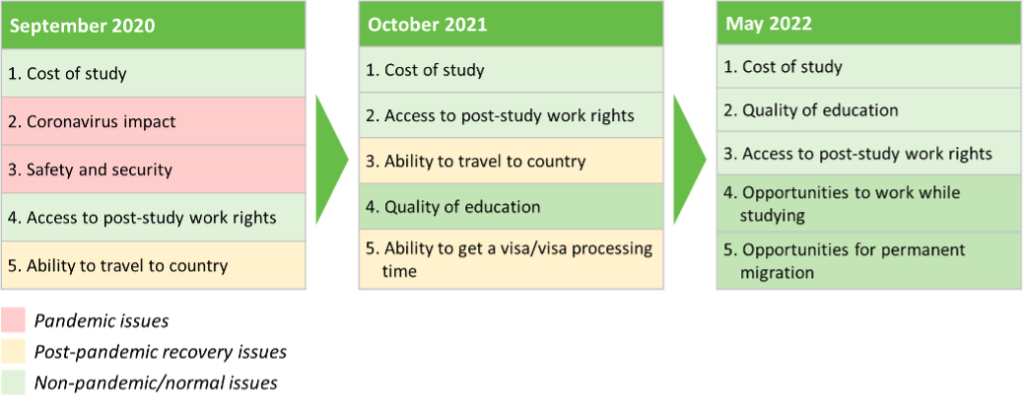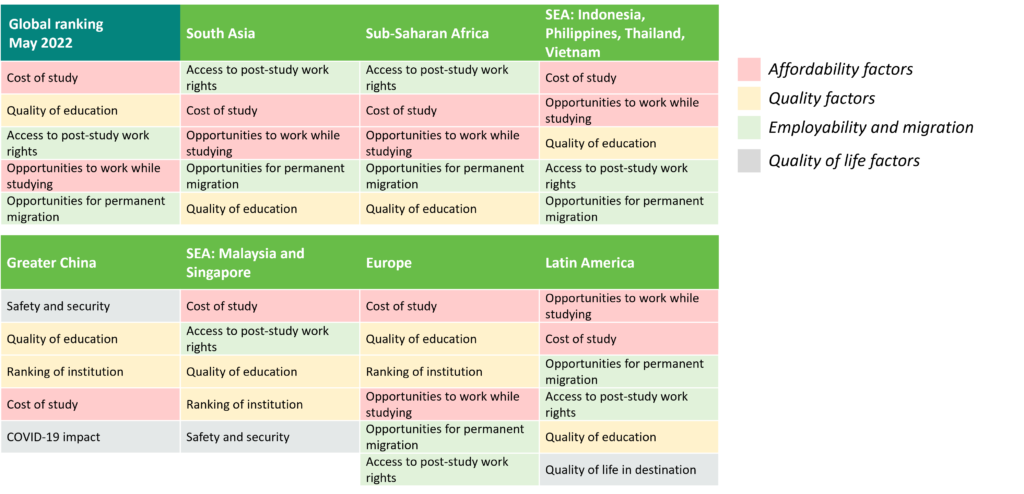
Traditional factors more influential than Covid concerns when choosing a study destination
Is the impact of COVID-19 still weighing on the minds of students when they are making decisions about studying overseas?
Throughout the pandemic, the Navitas Agent Perception Survey has tracked agent views on what students and parents are considering when choosing where to study.
One of the clearest signs of a return to pre-pandemic normality is visible in the latest responses to the question, “What are currently the most important factors influencing student choice of study destination?”
At the start of the pandemic, there was no doubt that COVID-19 and associated travel restrictions were a significant concern. Agents reported these to be the second and fifth most important factors respectively in September 2020 and these concerns persisted during the first half of 2021.
The Navitas Agent Perception survey conducted in October 2021 revealed a notable shift in concerns as the Northern Hemisphere geared up for the start of its academic year. Lockdowns and restrictions were easing, vaccines were more widely available, and international travel was resuming to and from most regions (with the exception of Australia, New Zealand and China). At this time COVID-19 impact fell out of the top five factors influencing student decision-making. Concerns focused more on practical considerations linked to the pandemic. Ability to travel rose to the third spot and ability to get a visa/visa processing times became a top five issue; some obstacles to international travel lingered while visa offices were just starting to reopen. Concerns about the quality of education surfaced as a top 5 issue.
In the most recent Navitas Agent Perception Survey of May 2022, the results appear as one might expect to have seen in pre-pandemic 2019. The top 5 factors influencing student choice of study destination comprise cost of study, quality of education, access to post-study work rights, opportunities to work while studying, and opportunities for permanent migration. The return to these familiar issues clearly indicates a return to pre-pandemic norms.
The one exception in the top five list of factors might be opportunities to work while studying, which may not have featured as prominently in the past. This could reflect concerns about inflation, weakening foreign exchange rates, and the rising cost of living, as well as the notable uncapping of restrictions on the ability to work during term time in Australia.
Figure 1: Global top five issues in response to “What are currently the most important factors influencing student choice of study destination?” – Sept 2020, October 2021, May 2022
Source: Navitas Agent Perception Survey – September 2020 (n=263) , October 2021 (n=811), May 2022 (n=603)
Note: Wording and options in response to this question contained some variations across the three different surveys.
Across all regions, destination choices are currently determined by perceptions of affordability, quality, employability and migration
International students from around the world share many common concerns and considerations when deciding where to study. The graphic below captures regional responses to the question “What are currently the most important factors influencing student choice of study destination?”
Figure 2: Ranking of issues response to “What are currently the most important factors influencing student choice of study destination?” – Summary
Source: Navitas Agent Perception Survey – May 2022 (n=603)
The summary reveals three key insights. First, the cost of study is a universal consideration. It is the number one concern globally and typically ranks as the number 1 or number 2 issue, with the exception of the Greater China region. The corollary to the issue of cost is the importance of opportunities to work while studying which provides both valued work experience but also the additional income to defray the high costs of study.
Second, students and their families along with any other party making an investment in the individual’s education will always be concerned about quality. Usually this pertains to the quality of the post-secondary system but can also be reflected in the consideration of institutional rankings, as is the case in Greater China, Malaysia, Singapore and Europe.
Third, employability and migration beyond graduation are increasingly part and parcel of the international study experience. An interest in migration may relate to temporary migration through post-study work rights, or to pathways to permanent migration – and very often both.
Finally, quality of life factors feature as a factor, albeit less important than the four categories of affordability, qualityand employability and migration listed above. Across all regions, safety and security is ranked as a number six issue, except in Greater China, Malaysia and Singapore where it makes the top five. Likewise quality of life in destination is ranked number nine globally, except in Latin America where it almost makes the top five at number six.
As the world moves into a period of ongoing change with new and emerging threats to public health, rising geopolitical tensions, worsening economic conditions and growing skills shortages, the Navitas Agent Perception Report will continue to track the factors that influence student choices.
For a more detailed view on the regional variations relating to choice of study destination, see our secondary Insights piece, How regional variations play out for international students deciding on where to study.





